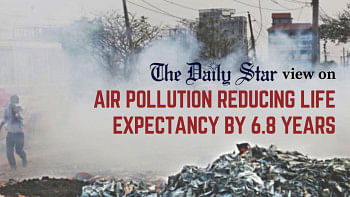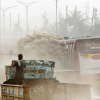Failed response to dengue and air pollution is no coincidence

Air pollution and dengue are undoubtedly among the biggest health threats facing residents of Dhaka, and other major cities, at present. While air pollution is causing about 20 percent of the total premature deaths in Bangladesh, dengue has also become one of the major causes of deaths over the past few years, with 2023 emerging as the deadliest in terms of both infections and deaths. However, the responses of the relevant authorities in checking both these threats have been surprisingly minimal. Against this backdrop, we find the High Court's criticism of the Department of Environment (DoE) and Dhaka city corporations for failing to make meaningful interventions quite deserved.
Over the last few years, the apex court has issued several directives about taking steps to prevent air pollution. In January 2020, it asked the DoE to shut illegal brick kilns in Dhaka and four surrounding districts. However, such brick kilns are still running on the outskirts of the city and elsewhere, with the authorities doing little to prevent it. Besides, other major sources of air pollution—including fumes from vehicles and construction dust—have also not been checked. As a result, air pollution has increased by almost 13 percent over three years in Dhaka, which continues to be ranked as one of the worst affected cities in the world. On average, each resident here has to spend about Tk 4,000 a year for diagnosis and treatment of symptoms likely caused by polluted air. Dhaka's air was "very unhealthy" even yesterday morning, with an air quality index (AQI) of 207.
Meanwhile, dengue has become almost invincible across the country, with 1,610 deaths recorded so far this year. It has long spread to all 64 districts, with the number of cases totalling 3,10,046 as of November 28. While the city corporations in Dhaka have failed to prevent the spread of the virus, hospitals in general were also not prepared to provide treatment to the large number of incoming patients. We observed with shock how our health system failed the poor and vulnerable when it came to dengue treatment. This is unacceptable.
We, therefore, urge the relevant authorities to take High Court's observations with due seriousness and urgently take steps to contain the double whammy of air pollution and dengue. They must produce results, not just rhetoric about their efforts.


 For all latest news, follow The Daily Star's Google News channel.
For all latest news, follow The Daily Star's Google News channel. 









Comments